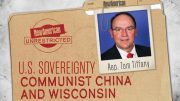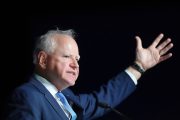One of the first criticisms over Donald Trump’s nomination of former Goldman Sachs banker Steven Mnuchin (shown) on Wednesday for Treasury secretary came from the Democratic National Committee: “So much for draining the swamp … nominating Steven Mnuchin to be Treasury Secretary is a slap in the face to voters who hoped [Trump] would shake up Washington.”
Just the name “Goldman Sachs” sends shivers down the backs of Americanists. Mnuchin would be the third Treasury secretary from Goldman Sachs since 1995, the other two being Henry Paulson under President George W. Bush and Robert Rubin under President Bill Clinton. But those shivers go far deeper: Goldman Sachs has provided so many alumni for top roles in government over the years that wags refer to the firm as “Government Sachs.” Those alumni include Mario Draghi, president of the European Central Bank, Mark Carney, the former governor of the Bank of Canada who is now the current governor of the Bank of England, and Malcolm Turnbull, the current prime minister of Australia.
Those concerned remember that Goldman Sachs was bailed out by American taxpayers in the aftermath of the real estate mortgage meltdown in 2008 that triggered the Great Recession. They remember that Goldman Sachs was “the company from which Obama raised the most money in 2008,” as noted by the Washington Examiner. They remember that Goldman Sachs CEO Lloyd Blankfein visited the White House frequently to confer privately with the president on matters that remain secret to this day.
Mnuchin has all the trappings of an insider. A Yale graduate, he started work at Goldman upon graduation, helped along no doubt by his father, Robert, who was a full partner at the firm for three decades. After 17 years working in the trading department, Mnuchin had amassed a small fortune estimated at about $40 million. He left the firm just before his 40th birthday to join his Yale roommate who was running a hedge fund. That stint lasted a couple of years when Mnuchin took a much better opportunity: to work for the hedge fund run by billionaire and funder of dozens of liberal anti-American groups, George Soros, in his Soros Management Fund.
They became close and worked together to purchase the failed housing lender IndyMac in 2009. That deal smelled to high Heaven from the first, with most of IndyMac’s liabilities being covered by the American taxpayer, and making Mnuchin a very rich man when he sold his interest in it to CIT Group last year.
He became a Hollywood film producer following his time with Soros, financing films such as American Sniper, Avatar, and Suicide Squad.
When he took on the task of helping raise money for Donald Trump’s campaign in May, it came with strings: If Trump won, Mnuchin would be first in line for Treasury secretary. He raised almost $170 million for Trump, Trump won, and Mnuchin is in.
Assuming the Senate consents, Mnuchin will run perhaps the most powerful agency of the U.S. government. He will be the federal government’s banker: paying the bills, raising the money to cover the increasing deficits through bond sales to investors and governments across the globe. He will be in charge of the IRS, which takes up 91,000 of the department’s 100,000 employees. He will, in short, be Trump’s financier and enforcer.
In looking for anything that might reduce those shivers, there is some comfort in three points: He did in fact raise $170 million for Trump, far more than he gave either to Hillary Clinton, Barack Obama, or Charles Schumer. (He claimed that he made those personal gifts “mostly as favors to friends who were fundraisers” for them.)
He sounds good in promoting the Trump agenda:
By cutting corporate taxes, we’ll create huge [his word] economic growth and we’ll [create] huge [his word again] personal income [growth]….
[Cutting those taxes] will be the largest tax change since Reagan….
Our most important priority is sustained economic growth, and I think we can absolutely get to [a] sustained three to four percent [growth in the] GDP, and that is absolutely critical for the country….
Taxes are way too complicated, and people spend way too much time worrying about ways to get them lower….
We believe in fair trade and we believe that’s going to be a big boost to the economy.
Finally, there is some small comfort in knowing that Mnuchin was never a partner at Goldman Sachs as were the previous two Treasury secretaries. He was just a trader, making millions until he could afford to leave and go out on his own. And, he hasn’t worked for “Government Sachs” since 2002.
Other than that, Mnuchin appears to be just one more Goldman Sachs alumnus who is part of the “revolving door” between the firm and the highest levels of the U.S. government, regardless of who is president or what party he represents.
Photo: AP Images
An Ivy League graduate and former investment advisor, Bob is a regular contributor to The New American magazine and blogs frequently at LightFromTheRight.com, primarily on economics and politics. He can be reached at [email protected].




